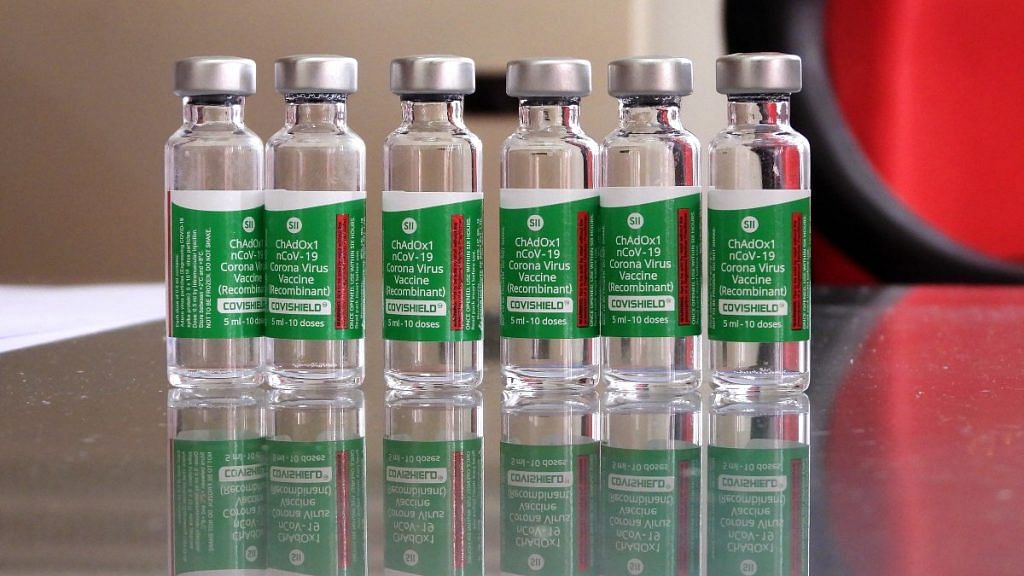New Delhi: The derivatives (sub-lineage) of the SARS-CoV-2 Delta variant have the potential to reduce the neutralisation ability of the Covishield vaccine, especially among those who have never been infected with Covid, ICMR researchers have found.
The team, based on the findings of a study of blood samples of vaccinated individuals, has recommended booster doses for people who have already been vaccinated.
The spread of the Delta variant in India led to a devastating second wave and has also caused a surge in cases worldwide.
“Delta variant has slowly dominated other variants of concern. Subsequently, Delta has further mutated to Delta AY.1 to Delta AY.126. Of these, Delta AY.1 has been reported from several countries, including India, and considered to be highly infectious and probable escape mutant,” researchers wrote in the study.
An escape mutant is one that can escape human immune response or vaccine induced immune response. Researchers had previously evaluated the efficacy of Covaxin against Delta AY.1 (because it is a escape mutant) and found the vaccine to be effective.
In the latest study posted on bioRxiv (a repository of pre-print studies) Thursday, researchers evaluated the neutralising potential of blood samples from people who had received two doses of the Covishield vaccine.
The study is yet to be peer reviewed.
The researchers said, however, that even with reduced neutralisation ability, Covishield will protect against severe disease and fatalities.
Also read: Covaxin, Covishield effectiveness highest when gap between doses is 6-8 weeks, ICMR study finds
Neutralising immune escape variants
The researchers studied three types of blood samples. The first was from people who have been fully vaccinated with Covishield, and have never been infected with Covid. The second was from people who have been fully vaccinated after recovering from Covid infection in the past. The third was from people got infected with Covid after being fully vaccinated — that is people who suffered breakthrough infections.
The blood samples were tested against Delta and its two derivatives — Delta AY.1 and B.1.617.3, using what is known as the 50 per cent plaque reduction neutralisation test (PRNT50). In this test, a blood serum sample is diluted and mixed with a viral suspension. The mixture is then left undisturbed to allow the antibody to react with the virus.
This is then poured over a layer of host cells, usually in a petri dish. The surface of the cell layer is covered with a layer of a jelly-like substance called agar to prevent the virus from spreading.
The researchers estimate the regions of infected cells — called plaques — formed after a few days. This can be done either using microscopic observation or specific dyes that react with infected cells.
The concentration of serum needed to reduce the number of plaques by 50 per cent gives the measure of how much antibody is present or how effective it is. This measurement is denoted as the PRNT50 value.
Researchers observed the highest reduction in the level of neutralising antibodies against the Delta variant — a reduction of 27.3-fold — among fully vaccinated individuals who had never been infected with Covid, compared to other groups and variants.
Neutralisation was reduced against Delta and AY.1 in all three groups.
Also read: ‘Cut Covishield gap, skies won’t fall’, says Covid task force member as vaccines pile up
Vaccines will protect against severe disease, fatality
However, the team said vaccines will continue to provide sufficient protection against the severity of the disease and fatality, based on breakthrough infections data they analysed.
“Several studies have reported the increase in immune response in Covid-19 recovered cases and breakthrough infections post vaccination,” the team noted in the study.
They said that such a rise in immune response actually helps effectively neutralise the immune escape variants in breakthrough Covid cases.
“Once the individual get re-infection after vaccination or vaccination post recovery, memory B cells (a type of white blood cells involved in immune response) are triggered that generate higher level of immune response,” the team noted.
The team concluded that “our findings suggest that Covishield vaccine was able to neutralize Delta derivatives and prevent serious disease and fatality among breakthrough cases,” the team said.
They added that a booster dose vaccination among fully vaccinated people who have never been infected with Covid-19 would achieve protective immune response to fight against emerging SARS-CoV-2 variants.
(Edited by Poulomi Banerjee)
Also read: ZyCov-D supplies to begin soon but may not be part of national vaccine programme right away
